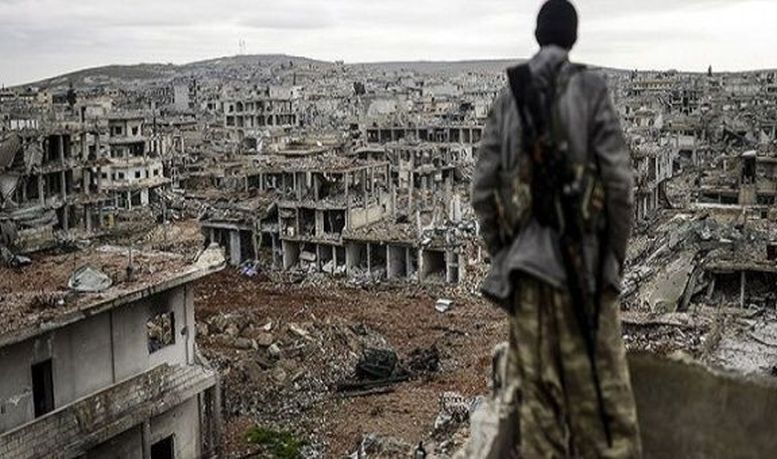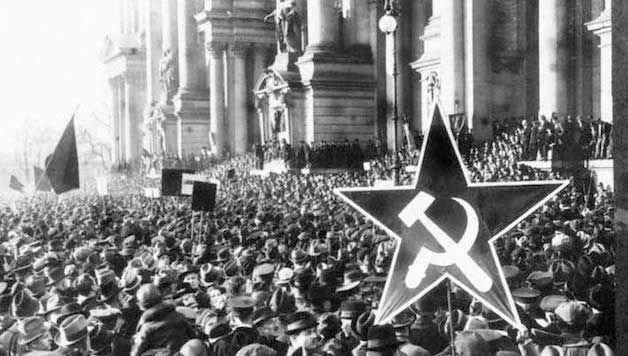Capitalism Does Not Lead to Democracy
The end of the neoliberal era was recently recognized by Canada’s Deputy Prime Minister Chrystia Freeland. Her speech on October 11, at the Brookings Institution in Washington, outlined a vision, what some are calling the “Freeland Doctrine,” stridently calling out China and Russia as geopolitical enemies of Western capitalism. She strongly urged Canada’s ruling class to fully participate in the new cold war with Russia and China.
The End of Neoliberalism
Freeland draws a compelling sketch of the rise and fall of the neoliberal era from the perspective of the Western capitalist class. Beginning, as she says, with the fall of the Berlin wall in 1989 and ending with the invasion of Ukraine by Russia in 2022, it was an era of capitalist triumphalism. Geopolitical conflict played a smaller role as many in the Western capitalist class adopted the slogan “make money, not war.” As Freeland says, “we were fat and happy, assured in our belief that we could do good by doing well.”
It is important for workers to understand that when Freeland talks of “we,” she means the ruling elites of the Western capitalist world. In hindsight, and with a false sense of concern, Freeland vaguely recognizes this, stating that “workers in our democracies have long understood that global trade without values-based rules to govern it made our people poorer and our countries more vulnerable. They have long known that it enriched the plutocrats, but not the people.” However, as Canadian workers know, she (and her class) has no intention of raising workers’ living standards.
The Western capitalist leaders claimed that the spread of free trade would lead to the gradual liberalization and eventual democratization of the whole world. As Freeland puts it, “not only did we believe that the capacity for liberal democracy was universal, we also thought it was inevitable — provided a society got rich enough.”
Although Freeland does not talk about it, the collapse of Stalinism accelerated and confirmed China’s shift into a capitalist, and imperialist, power. The ruling classes of the United States, Canada, and China all benefited from the greater integration of their economies throughout this period. Similarly, after the fall of the Berlin Wall, Western European capitalists and Russian oligarchs both got rich off the exploitation of the newly opened markets and newly “freed” working class of the eastern bloc. But the enrichment of the Chinese and Russian ruling classes did not lead to democratization. In the case of China, this process created a new economic and geopolitical rival for Western capitalism. While Russian capitalism did not grow nearly as powerful, the growing rift with the interests of Western imperialism turned Putin and Xi into allies of convenience, leading to the two reaching a “no-limits” deal right before Putin’s invasion of Ukraine.
From Freeland’s perspective, the supremacy of capitalist democracy in the world is no longer inevitable. She argues that the western capitalist class needs to develop a new strategy to defend their social order. Referring to the famous declaration of the “end of history” by American political scientist Francis Fukuyama in 1992, Freeland said, “The Cold War is still over, but so is the End of History. It is up to us to design what replaces it.” She goes on to warn, “the world’s democracies must be realistic about the world we inhabit. History has not ended. We share the planet with authoritarian regimes and there is no inevitability to their decline, just as there is no inevitability to our continued existence.”
Defining the New Era
Freeland defines this new era by the geopolitical conflict between the forces of “democracy” and “authoritarianism.” But this is a simplistic and false characterization. What Freeland really means, which is understood by her audience — the elites of the western capitalist world — is that this is a conflict between NATO countries on the one side and China and Russia on the other. As Socialist Alternative has explained, NATO is by no means a force for democracy. NATO countries, including the US and Canada, are quite happy to be friends with authoritarian rulers in Saudi Arabia and Turkey when their geopolitical interests align, and to use violence to suppress democratic movements that oppose NATO interests such as in Algeria, Vietnam, and Haiti.
This misleading separation of the world into “democracies” and “authoritarian regimes” becomes even clearer when Freeland describes how NATO countries should orient themselves to the rest of the world. Beyond arguing for greater climate-destroying military spending, and applauding the undemocratic manoeuvres of the governments of Finland and Sweden to join NATO, Freeland argues that their camp should be open to any democracy in Asia, Africa, the Middle East, and Latin America “that shares our values and is willing to play by collectively agreed upon rules.” Those “rules,” of course, will require defending the supremacy of capital and enforced economic hardship for the working class. Should one of these countries democratically decide to go another way, towards redistribution of wealth and democratic control over the economy, Freeland’s Canada would use violence to overthrow it as it did in Haiti in the 2000s. In 1970 Henry Kissinger showed his deep contempt for democracy, justifying his role in helping to plan the coup against Chile’s elected government in 1973 by stating, “I don’t see why we need to stand by and watch a country go communist due to the irresponsibility of its people.” In a dramatic understatement, Freeland admits, “the West is not innocent of imperialism or transactional deals.”
Freeland’s declaration of the end of neoliberalism echoes the International Socialist Alternative’s analysis from the beginning of 2021 that pointed to the end of neoliberalism and the beginning of a new “Age of Disorder.” A key feature of the old neoliberal era was that globalization was a driving force behind the growth in world capitalism. But today, globalization has created new problems for the capitalist system. Globalization created brittle global supply chains that completely collapsed under the weight of the pandemic and war, leading to the current economic crisis of rising inflation and supply shortages.
In the Age of Disorder, the dominant trend is no longer globalization, but instead the division of the world into economic blocs. The United States is no longer the sole global hegemon; the US capitalist class and its allies must compete with the Chinese capitalist class and its allies for access to markets and strategic resources. But this decoupling of previously integrated economies is itself a source for conflict, as has been seen with the European energy crisis driven by reliance on Russian gas. As Freeland puts it, “The economic ties we thought would constrain Russian bellicosity are instead being used to try to blunt our response to the Kremlin’s war crimes.” The vulnerability of relying on foreign suppliers is shown by the US’s reliance on microchips produced in Taiwan and China. This has helped ratchet up tensions with China, and led the Biden administration to invest $280 billion to dramatically expand US production of semiconductors.
This process of strategic decoupling is being called “friend-shoring,” in reference to the process of “offshoring” that was typical of neoliberal globalization. Friend-shoring refers to the moving of jobs and production in strategic sectors to allied countries and away from rival countries. Freeland’s speech specifically called for Canada to fast-track energy and mining projects of its allies to help them decouple from their cold war rivals. While couched in language of “green capitalism,” claiming that somehow the Canadian energy sector is working towards a green transition is empty phraseology from a government that continues to expand fossil fuel production, and that spent $15.6 billion this year to subsize the fossil fuel industry.
Government Policy
It’s not clear yet to what degree Freeland’s proposals align with the policy of the Trudeau government. Up until now, Canada has lagged behind the United States and other allies in decoupling from China, including being the last of the Five Eyes countries to boot Huawei from 5G telecommunications infrastructure. The Foreign Affairs Minister Melanie Joly is set to release a new Indo-Pacific strategy in the coming weeks that will show if and by how much this orientation has shifted.
Imperialist Conflict and Escalation is Inevitable Under Capitalism
Chrystia Freeland is correct insofar as she recognizes that a new cold war is already a reality. However, the conflict between the US and China-led blocs is not based on ideology or political principle. The conflict is also not something that either side can avoid. The ruling classes both of NATO and of China and Russia would prefer to avoid open conflict and continue to get rich “peacefully” through the exploitation of the planet and their respective working classes. But, unfortunately for the working class of the world, inter-imperialist conflict is an inevitable consequence of the economic forces of capitalism itself.
Capitalist economies must continuously grow to survive, and they eventually outgrow the size of their own markets. This leads to competition over finite resources and foreign markets. The ruling class of every capitalist country must choose to either become subservient to a stronger capitalist country or come into open conflict with their rivals. This is the imperialism of developed capitalism as Lenin explained. Today, with the US and China being the clear superpowers, all regional powers are ultimately forced to “pick a side” and subsume their own interests to a lesser or greater degree to the interests of their respective bloc.
In the short term, the new cold war will remain “cold,” as far as direct conflict among the superpowers is concerned. However, as Ukrainians fully know, this does not mean there will not be cruel and bloody wars. There are deep contradictions in today’s inter-imperialist rivalries. All sides recognize their continued interdependence and the need for world trade. Freeland says, “we should continue to trade, but we should avoid strategic vulnerabilities in our supply chains and our economies more broadly.” But the need to avoid “strategic vulnerabilities” can only derive from the possibility of a “hot” war in the future. The longer capitalism remains the dominant world economic system, the more likely catastrophic global conflict becomes.
The International Working-Class Struggle for Democracy
Freeland’s proposed policy for Western capitalism in the new era is to recognize the reality of the new cold war and to prepare to win it. But victory for western capitalism is only victory for corporations and billionaires, not for working-class people. It is true that today, working-class people in the Western capitalist world have significantly more democratic rights than their peers in Russia or China. But those democratic rights had to be won, and have to constantly be defended, through struggle against the Western ruling classes, who throughout history have fiercely resisted every extension of democratic rights beyond the wealthy minority. Furthermore, the experience of the neoliberal era has shown definitively that capitalism does not automatically lead to democracy. This is why working-class people in every country must recognize their common interests with each other and oppose imperialism on all sides, including the capitalist class in their own countries, whether in the US, Canada, China, or Russia.
The international working class must support the struggle of the Russian and Chinese masses for democratic rights, but they must recognize that the forces of NATO will never bring democracy to Russia or China. In this era of capitalist crisis and inter-imperialist conflict, the defeat of one imperialist power by another will serve only to shift the balance of power between the imperialist states and will do nothing to improve the conditions of the working class. The working class needs independent forces of struggle and self-defence that can link up across the cold-war borders and struggle against imperialism on all sides. This is the only path forward for democracy, human rights, and a healthy environment for all humanity.




